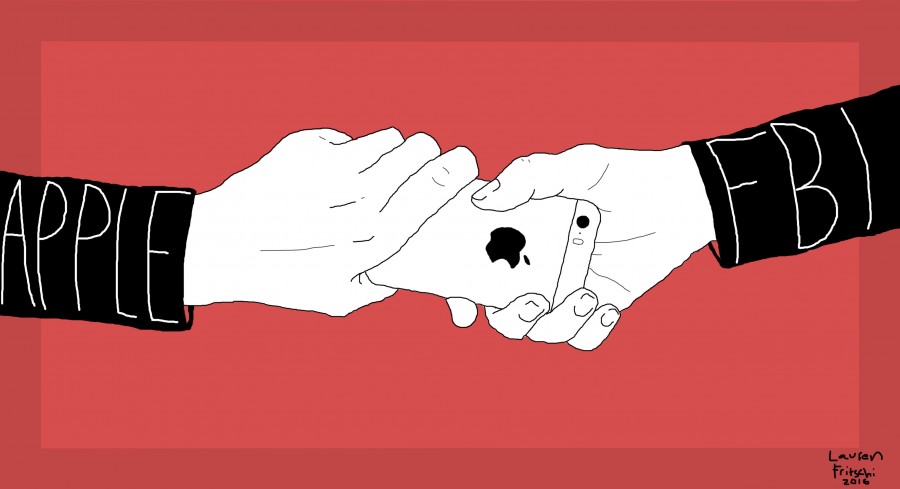FBI vs. Apple case jeopardizes privacy of users
The FBI and Apple are engaging in a legal battle of tug of war over the access to technological database of iPhones in the price compromising users’ trust and privacy.
March 10, 2016
Apple has denied the FBI access to unlock the San Bernardino shooter’s encrypted iPhone 5c.
The phone has a security feature that will erase the data after unsuccessful login attempts.
Apple would have to make new software in order to supply the FBI with access to millions of Americans iPhones.
Apple CEO Tim Cook refuses to release the information of American-owned iPhones to the FBI.
Apple has officially filed a formal legal response denying to help the FBI. They have held their decision for the reason that the FBI and the Department of Justice are hoping to set aside the privacy and security rights of the millions of iPhone owners around the world through the court.
Apple’s attorney Bruce Sewell, security expert Susan Landau and New York District Attorney Cyrus R. Vance, Jr. will be representing Apple.
They have negotiated for the FBI to drop their demand although they would favor to form a commission that discusses technology and civil liberties.
The House Judiciary Committee held a congressional hearing about encryption. Apple also plead their case on the same day. James Comey, the FBI director, testified on the first panel.
The American Civil Liberties Union is supporting Apple since ruling in favor of the government would bring terrible consequences to iPhones because it would become an easy access for hackers.
“If Congress had intended that private entities and individuals be forced to provide such extraordinary assistance to government investigations, Congress would have passed a law to that extent,” wrote the Lavabit company in the amicus brief they submitted as support for Apple. The company had a similar situation with having to provide for outrageous demands made by the government in 2013. This resulted in the company’s termination of services as a way of avoiding being forced to provide user data.
Apple’s motion asks to vacate the court order that confirms that they must provide the FBI the access. Not only is the FBI’s request unconstitutional, but according to TechCrunch Website there has never been a case where the court could take government power to force companies to provide the government with personal individual information to such an extent as iPhones. Lavabit company wrote that the FBI’s request violates the All Writs Act and the rights provided to Apple through the United States Constitution.
If the FBI were to win the case, then Apple would have to create a new software that grants such power. It would also disrupt Apple’s reputation as a secure brand.
“I would be on Apple’s side in this case, because people’s privacy is on the line,” said senior Betsaida Sebrano, “And it’s not necessarily because of the argument that people have or don’t have something to hide. The FBI shouldn’t need to gain access to all iPhones for one phone to be investigated. Doing this would abuse people’s right to privacy.”








